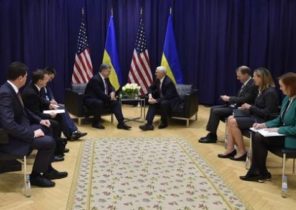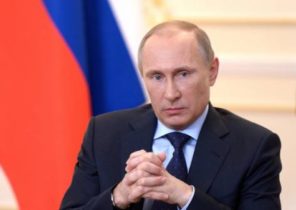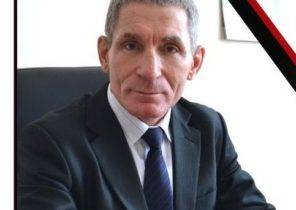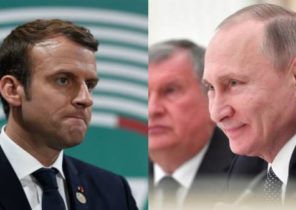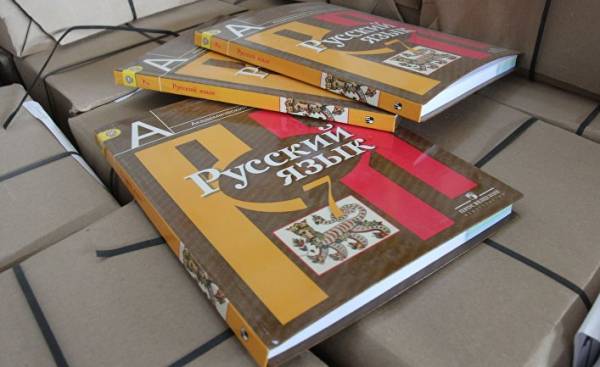
Last week at the University of Vilnius hosted a discussion “Prospects of the Russian language in Lithuania”, which came to the conclusion that the position of the Russian language in Lithuania in the last decades has changed.
“More and more Russian in Lithuania, especially young people, relate to the Russian language — native, but less socially significant, besstolpny, and what is especially absurd it sounds to the Russian ear, brain and heart — foreign”, — said the Professor of Historical faculty of the WU Gregory Potashenko.
“I would like to remind the results of a survey of young people conducted relatively recently by the Council of Ministers of Northern countries in Lithuania, which showed that the majority of respondents perceive Russian as the language of propaganda, and any information in English accept as true,” — said a member of the Seimas Audronius ažubalis.
In the discussion participated head of the Department of Russian Philology associate Professor Paul lavrinec, members of the Seimas Audronius ažubalis and Arunas Gelunas, the main editor of the Russian version of Delfi in Lithuania Oleg Yerofeyev, associate Professor of Historical faculty of the WU Gregory Potashenko and others.
According to the census of the Lithuanian population, conducted in 2011, Russian language is native for 89.3% of the Russian inhabitants of the country. Meanwhile, the Lithuanian language is native to 99.4% of Lithuanians. About 41.6% of residents of Lithuania, in addition to their native language, speak one foreign language, usually Russian, English, Lithuanian, German and Polish. Every third resident of Lithuania (in 2001 one in four) indicated that he knows two foreign languages, most often English and Russian, Russian and Polish, English and German.
Interest in Russian Philology decreases
Head of the Department of Russian Philology WU associate Professor Paul lavrinec explained why the idea of holding such a discussion. “Why does the Department of Russian Philology became the initiator of this discussion? Because we have a situation with the Russian language, as we feel it in Lithuania, directly concerned. We see that if five years ago we came, my freshman year, dozens of students, number of students gradually decreased,” — said lavrinec.
“In 2014 we of inertia, apparently, did the other 16 people. It was already fall, but then, a year later, because of the looming heavy atmosphere and tense relations between Lithuania and Russia, Russia and the European Union, came to us 6 people. And I laughed that the reception increased by 42% when did the 8”, — he stated. Head of the Department of Russian Philology fears of possible short-sighted decisions that may be taken in this situation, the officials said.
“For example, this recent order of the Minister of education, according to which not to be carried out undergraduate programs if they register less than 15 people. We fall into the category that lists the Philology of foreign languages. The administration of the faculty tried to explain to the Ministry of education, Polish and Russian language is not entirely foreign languages, that’s something else for Lithuania should be, but it did not. So the risk really is that some things may disappear and then they will be very hard to regain” — expressed their concern about lavrinec. He also noted that the decline of interest in the programme Russian Philology may be due to the fact that high school graduates — Russian and Lithuanian — I don’t see prospects for development of Russian humanitarian thought in Lithuania.
Need to read Dostoevsky
The discussion was attended by former Minister of culture, member of the Seimas Arunas Gelunas, who expressed confidence that the Russian language and Russian Philology should be created all conditions for development. “I remembered a quote by Thomas Mann from a novel or when an international company was a foreigner who spoke only their native language. Now, face the alien was like a deaf-mute. So thank God, Lithuania historically spoke different languages, I mean, and the Grand Duchy of Lithuania and today’s Lithuania. Our generation speaks Russian and English and is still well — in Lithuanian”, — said the politician.
He recalled that recently in Lithuania hosted a Forum of free Russia, in which the journalist Edmundas Jakilaitis led a discussion on the Russian language. “But he was not talking with officials of Russia, and with the opposition, and it was a great pleasure to listen to their conversation in Russian. And I was very happy to hear this discussion in English and Russian,” — said Gelunas. “And the question of whether it is necessary to analyze Dostoevsky in Lithuania, the answer is Yes. Do I need to read Berdyaev in Russian, of course. Whether it is necessary to read the modern humanitarian thinkers in Russian?— Of course. After all, the last thousand years, Lithuania and Russia spoke on a variety of levels, and the communication was constant. So why do we want to deprive the future of Russian Philology only because of the events of the last three years? I think this is a very shortsighted perspective, we need to Wake up and not make mistakes,” concluded Gelunas.
To prevent pointless channels
Senior news editor, Lithuanian radio Nina Matskevich discussed the limitations of broadcasting programs in the Russian language in the broadcast of LRT. “When we were talking about the information war, we thought that we could expand our coverage, but nothing has been done. We publish news daily on the website of the Lithuanian LRT, where no one can see. And it is believed that in this way we are fighting with propaganda. Yes, we do the news well, I hope we have interesting programs, but who sees it?”, — asks Mackiewicz.
She commented on the decision of the Seimas, who on Thursday decided that the programmes in the official languages of the European Union (EU) shall not be less than 90% relayed and distributed via the Internet television programs each offer customers a package of TV programs. For such amendments proposed by the conservatives by Laurynas a Camunas, this Situation is Pavilenis, by Paulus Saudargas, Vytautas Karnagio voted 66 members of the Seimas, against three parliamentarians, five members of the Seimas abstained.
“The fact that the vote is absolutely rubbish, it is so simple way that requires no investment, efforts, vote, put a tick. But actually the people who watched the cable channels, can’t see those transmissions are considered hostile Lithuania. They are no longer shown. Who wants to, he bought a “plate” and looks. And if you think so you can influence minds, you are mistaken,” he said, referring to politicians, Mackiewicz.
According to the editor, the objective is “absolutely nowhere”, as the older generation of Russians of Lithuania is not to persuade and to close the channels is pointless, and the youth in General TV watching, news searches the Internet. “As for the Russian language in Lithuania, we have a group of wonderful Ministers who, while they are Ministers, they don’t speak Russian, they forget Russian language as soon as they of the Ministers leave, they suddenly remember him. For example, our mayor Šimašius this is very different when he was Minister of justice, he’s not one word in Russian is not spoken, and we tried to interview him, now he says fine and even signs hangs. In General, I think that politicians would have to think about giving Russian language the status of traditional. Once we had the traditional menshinstva, but we abandoned this concept, but for Russian and Polish languages this would need to be done,” he said.
Native, but besstolpny
Associate Professor of Historical faculty of the WU Gregory Potashenko identified a few negative for Russian trends in the field of demography (the situation and status of Russian schools, Russian language and public life of the country), and in the field of protection of cultural rights of Russians of Lithuania. “It is clear that was much less Russians themselves: 28 years ago, it was nearly 350 thousand, now is 140 thousand. In addition, the future of the Russian language in Lithuania is limited, because on it hangs a load of political systems and practices of the Imperial past, i.e., tsarist and Soviet, which is in Lithuania I remember very well and good that remember. And, besides, the present policy of the Kremlin does not always help Russians abroad, and when they say that it is necessary to strengthen the “Russian world”, it would end not very well. Ask the Russian Donbass, as they became well after 2014,” remarks Potashenko.
He also notes that the Russian language has lost its primary importance and the status of mandatory administrative language, and only for Lithuanian Russian Russian language performs its main role of ensuring Russian national identity. “It should be noted that this role of the Russian language Lithuania is significantly losing. And the reasons are too few — the network of Russian schools and the number of pupils in them has decreased dramatically, programs latinizers, teachers specially are not prepared. Therefore, the majority of local and foreign experts disappointing appreciate the existence of Russian schools of Lithuania and, therefore, the development of the Russian language in General, Russian as a home language. Even in the families of Russian language ceased to be the language of everyday communication,” regret said the historian.
Citing experts and their personal experiences, Potashenko stresses that parents in families still communicate in Russian, but with children often in Lithuanian. “In this sense, the Russian language is losing its role of preserving the national identity. Russian language in Lithuania is becoming the language of socially subordinate minority, it is natural, it is native, minority, and therefore not as socially prestigious as the Lithuanian state. And more and more Russian in Lithuania, especially the youth, this person’s attitude to the Russian language — native, but less socially significant, besstolpny, and what is especially absurd it sounds to the Russian ear, brain, and heart, foreign,” — says the scientist.
He stressed that the Russian language has no official status in Lithuania, also foreign, and the authorities carried out its relation to the dual policy — on the one hand it is a foreign language, and the language of large minorities, recognized in the public education system. “After all, we have Russian or partly Russian. Russian is also allowed in the mass media of Lithuania, as well as in private life. But in the public sphere of Lithuania, the Russian language is a big problem, as other languages than Lithuanian. The use of Russian language is limited to administrative in Lithuania, and it is clear that here the language starts Merchiston national policy,” said Potashenko.
“In my understanding here should be seen as manifestations of the two directions of the ethnic policy of modern Lithuania — it is the policy of hegemony or domination of one nation, when protected rights of the Lithuanian language and Lithuanian culture, but to different degrees confined to the languages of national minorities. But the third area of ethnic policy is a cultural pluralism that had prevailed in Lithuania in 90-e years, but in the last 10-15 years has clearly replaced the other two. In this context, I see the position of Russian schools and the Russian language in Lithuania,” concludes associate Professor at the history Department of VU Potashenko.
Multilingualism is our strength
Former Minister of foreign Affairs, member of the Seimas Audronius ažubalis at the discussion recalled their early years in multilingual Vilnius. “I grew up in an environment where there lived Yasha, Blumenson, Vovik, and shreds, and Yang, and many more who, so I do all is close and clear. And I’d like to talk about the prospects of Russian citizens in Lithuania. I see the strengths of the Lithuanian state, is the multilingualism. And we still win, I mean the politics, cultural and social spheres. Ordinary vilniuses today can speak three languages — tuteyshih (not exactly Polish, but local dialect), Russian and Lithuanian. Of course, those times when you walked down the Avenue and heard Yiddish everywhere — this is the last time. And the only people my age and older still remember them,” said Azubalis.
At the same time he noted that today’s young people have preference for English. “But, nevertheless, multilingualism is our strength, although we see that this force decreases. For some reason, it is necessary to ask not me. But recently the foreign Ministry of Lithuania were held (for positions — approx. ed.) — in 2011 and 2015, and the situation has not changed and even deteriorated. In the 2015 adopted 25 future diplomats and barely of them scraped together the seven that spoke in the Russian language at the level B1. Knowing that Eastern space, starting from Asia and ending with Belarus, Ukraine and Russia, where Russian language is of great importance, I take it as a challenge and anxiety”, — the politician noted.
He also stressed that the Russian language in Lithuania is used by different people, but after the events in Ukraine, his status has changed. “After 2014, he became politicized, became the object of attention, and there’s a lot of confusion. Often we do not distinguish, where the Kremlin, where Russia, where Moscow and where Russian people. And at the same time, when we talk about hybrid war and information channels, not necessarily that the people who are watching Russian television, susceptible to Russian propaganda”, — said the politician.
He recalled the results of a survey of youth conducted by the Council of Ministers of Northern countries in Lithuania, which showed that the majority of respondents perceive Russian as the language of propaganda, and any information in English accept as true. “And when they were asked to indicate the most reliable sources of information, they called the BBC, CNN and RT. That is the reality which shows that the Kremlin has crossed a language barrier,” concluded ažubalis.
95% of the population know Russian language
The chief editor of Delfi Oleg Yerofeyev, the discussion turned to the figures and cited some statistical data. “We are the last 8 years, followed by studies related to the Russian language and its use in Lithuania. By the way, this debate was announced such as: the Russian language is the language of the citizens of Lithuania or the instrument of hostile propaganda? Both, of course. In 2009, a survey was conducted, according to which in the large cities of Lithuania, 99% of the population claim to know the Lithuanian language, and 95% know Russian. 29% of Lithuanians of Vilnius use this language in communication, 16% — read books, 37% of respondents watch Russian TV, and 12% write in Russian. If you take another slice: 2015 — September 1 in schools with Russian language of instruction has come 1500 first graders, which is 63 more than the year before,” said Yerofeyev.
He also recalled the results of a representative survey of representatives of national minorities, which was held in 2015, the company Baltijos tyrimai in Vilnius, Vilnius district, klaipėda, Šalčininkai district and Visaginas. In the survey, more than one third (37%) of ethnic minorities of Lithuania indicated that the education they received in the Lithuanian language, 46% — in Russian and 14% — in Polish. On the question of what language they communicate at home, 39% of minorities indicated that the family speak Russian, 30% of respondents indicated that the houses give preference to the Lithuanian language, 18% — Polish. Meanwhile, 68% of Russians of Lithuania said that the house used only Russian language.
“So we can conclude that the Russian language is the language of the citizens of Lithuania, and whether it is a language hostile propaganda? Yes, it is the language of hostile propaganda. This question too can be answered in the affirmative. Although hostile propaganda can be in English. But it should be noted that hostile propaganda speaks to some part of the population that watch TV on Russian language. But then the question arises: does this language replaces these people have reason and critical thinking? The question is very ambiguous. Oddly enough, but contrary to this propaganda and all the efforts of the so-called “Russian world” to expand its influence, which affects the popularity of the Russian language, I would say that in the service sector or labour relations knowledge of the Russian language is one of the components of success and the key to higher competitiveness in the market”, — concluded the chief editor of Delfi.

